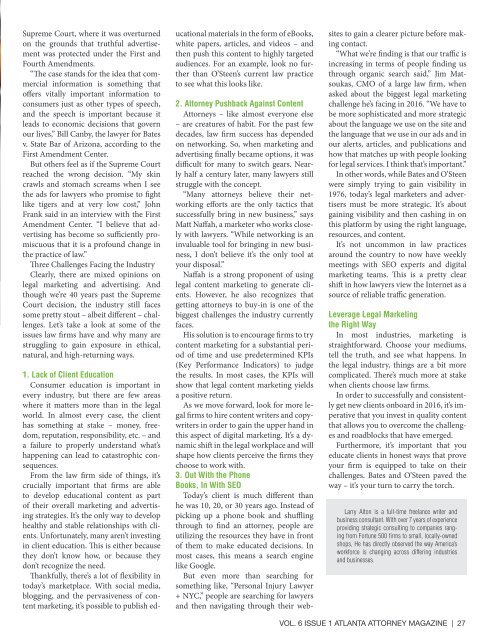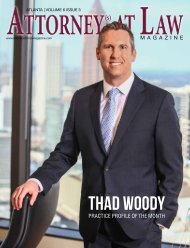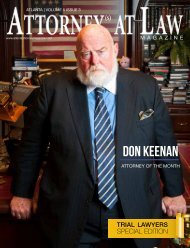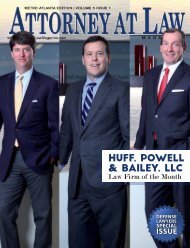WebV2_AAL_02_17
Featuring top Atlanta attorneys and industry thought leaders in each issue.
Featuring top Atlanta attorneys and industry thought leaders in each issue.
You also want an ePaper? Increase the reach of your titles
YUMPU automatically turns print PDFs into web optimized ePapers that Google loves.
Supreme Court, where it was overturned<br />
on the grounds that truthful advertisement<br />
was protected under the First and<br />
Fourth Amendments.<br />
“The case stands for the idea that commercial<br />
information is something that<br />
offers vitally important information to<br />
consumers just as other types of speech,<br />
and the speech is important because it<br />
leads to economic decisions that govern<br />
our lives,” Bill Canby, the lawyer for Bates<br />
v. State Bar of Arizona, according to the<br />
First Amendment Center.<br />
But others feel as if the Supreme Court<br />
reached the wrong decision. “My skin<br />
crawls and stomach screams when I see<br />
the ads for lawyers who promise to fight<br />
like tigers and at very low cost,” John<br />
Frank said in an interview with the First<br />
Amendment Center. “I believe that advertising<br />
has become so sufficiently promiscuous<br />
that it is a profound change in<br />
the practice of law.”<br />
Three Challenges Facing the Industry<br />
Clearly, there are mixed opinions on<br />
legal marketing and advertising. And<br />
though we’re 40 years past the Supreme<br />
Court decision, the industry still faces<br />
some pretty stout – albeit different – challenges.<br />
Let’s take a look at some of the<br />
issues law firms have and why many are<br />
struggling to gain exposure in ethical,<br />
natural, and high-returning ways.<br />
1. Lack of Client Education<br />
Consumer education is important in<br />
every industry, but there are few areas<br />
where it matters more than in the legal<br />
world. In almost every case, the client<br />
has something at stake – money, freedom,<br />
reputation, responsibility, etc. – and<br />
a failure to properly understand what’s<br />
happening can lead to catastrophic consequences.<br />
From the law firm side of things, it’s<br />
crucially important that firms are able<br />
to develop educational content as part<br />
of their overall marketing and advertising<br />
strategies. It’s the only way to develop<br />
healthy and stable relationships with clients.<br />
Unfortunately, many aren’t investing<br />
in client education. This is either because<br />
they don’t know how, or because they<br />
don’t recognize the need.<br />
Thankfully, there’s a lot of flexibility in<br />
today’s marketplace. With social media,<br />
blogging, and the pervasiveness of content<br />
marketing, it’s possible to publish educational<br />
materials in the form of eBooks,<br />
white papers, articles, and videos – and<br />
then push this content to highly targeted<br />
audiences. For an example, look no further<br />
than O’Steen’s current law practice<br />
to see what this looks like.<br />
2. Attorney Pushback Against Content<br />
Attorneys – like almost everyone else<br />
– are creatures of habit. For the past few<br />
decades, law firm success has depended<br />
on networking. So, when marketing and<br />
advertising finally became options, it was<br />
difficult for many to switch gears. Nearly<br />
half a century later, many lawyers still<br />
struggle with the concept.<br />
“Many attorneys believe their networking<br />
efforts are the only tactics that<br />
successfully bring in new business,” says<br />
Matt Naffah, a marketer who works closely<br />
with lawyers. “While networking is an<br />
invaluable tool for bringing in new business,<br />
I don’t believe it’s the only tool at<br />
your disposal.”<br />
Naffah is a strong proponent of using<br />
legal content marketing to generate clients.<br />
However, he also recognizes that<br />
getting attorneys to buy-in is one of the<br />
biggest challenges the industry currently<br />
faces.<br />
His solution is to encourage firms to try<br />
content marketing for a substantial period<br />
of time and use predetermined KPIs<br />
(Key Performance Indicators) to judge<br />
the results. In most cases, the KPIs will<br />
show that legal content marketing yields<br />
a positive return.<br />
As we move forward, look for more legal<br />
firms to hire content writers and copywriters<br />
in order to gain the upper hand in<br />
this aspect of digital marketing. It’s a dynamic<br />
shift in the legal workplace and will<br />
shape how clients perceive the firms they<br />
choose to work with.<br />
3. Out With the Phone<br />
Books, In With SEO<br />
Today’s client is much different than<br />
he was 10, 20, or 30 years ago. Instead of<br />
picking up a phone book and shuffling<br />
through to find an attorney, people are<br />
utilizing the resources they have in front<br />
of them to make educated decisions. In<br />
most cases, this means a search engine<br />
like Google.<br />
But even more than searching for<br />
something like, “Personal Injury Lawyer<br />
+ NYC,” people are searching for lawyers<br />
and then navigating through their websites<br />
to gain a clearer picture before making<br />
contact.<br />
“What we’re finding is that our traffic is<br />
increasing in terms of people finding us<br />
through organic search said,” Jim Matsoukas,<br />
CMO of a large law firm, when<br />
asked about the biggest legal marketing<br />
challenge he’s facing in 2016. “We have to<br />
be more sophisticated and more strategic<br />
about the language we use on the site and<br />
the language that we use in our ads and in<br />
our alerts, articles, and publications and<br />
how that matches up with people looking<br />
for legal services. I think that’s important.”<br />
In other words, while Bates and O’Steen<br />
were simply trying to gain visibility in<br />
1976, today’s legal marketers and advertisers<br />
must be more strategic. It’s about<br />
gaining visibility and then cashing in on<br />
this platform by using the right language,<br />
resources, and content.<br />
It’s not uncommon in law practices<br />
around the country to now have weekly<br />
meetings with SEO experts and digital<br />
marketing teams. This is a pretty clear<br />
shift in how lawyers view the Internet as a<br />
source of reliable traffic generation.<br />
Leverage Legal Marketing<br />
the Right Way<br />
In most industries, marketing is<br />
straightforward. Choose your mediums,<br />
tell the truth, and see what happens. In<br />
the legal industry, things are a bit more<br />
complicated. There’s much more at stake<br />
when clients choose law firms.<br />
In order to successfully and consistently<br />
get new clients onboard in 2016, it’s imperative<br />
that you invest in quality content<br />
that allows you to overcome the challenges<br />
and roadblocks that have emerged.<br />
Furthermore, it’s important that you<br />
educate clients in honest ways that prove<br />
your firm is equipped to take on their<br />
challenges. Bates and O’Steen paved the<br />
way – it’s your turn to carry the torch.<br />
Larry Alton is a full-time freelance writer and<br />
business consultant. With over 7 years of experience<br />
providing strategic consulting to companies ranging<br />
from Fortune 500 firms to small, locally-owned<br />
shops, He has directly observed the way America’s<br />
workforce is changing across differing industries<br />
and businesses.<br />
VOL. 6 ISSUE 1 ATLANTA ATTORNEY MAGAZINE | 27










